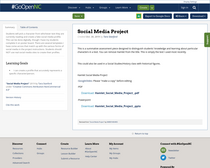Description
- Overview:
- Students will pick a character from whichever text they are currently reading and create a fake social media profile. This can be done digitally, though I have my students complete it on poster board. There are several templates I have come across that match up with the various forms of social media in the project instructions.
Students should NOT use real social media sites to create their profiles.
- Remix of:
- Social Media Project
- Subject:
- English Language Arts, Reading Informational Text, Reading Literature
- Level:
- Middle School, High School
- Grades:
- Grade 6, Grade 7, Grade 8, Grade 9, Grade 10, Grade 11, Grade 12
- Material Type:
- Assessment
- Author:
- Tara Stanford
- Date Added:
- 10/30/2019
- License:
-
Creative Commons Attribution Non-Commercial

- Language:
- English
- Media Format:
- Downloadable docs, Text/HTML
Comments
Standards
Evaluations
No evaluations yet.


This is helpful to both the students and the teachers. The resources are clear and make it easy for students to complete plus makes it easy for teachers to assess. Students can select their preferred platform and add engaging motivational element on social media.
Creative plan that meets students in their world as digital natives. Engaging and relevant to their experiences.
I am a 7th grade teacher and can see how this would be a highly engaging activity for my students. Full alignment to depth and breadth of standard RI.9-10.3 and partial alignment of standard RL.9-10.3, specifically for advancement of the plot. Has clear and sufficient assessment strategies that will accurately measure student progress and mastery of specified standards. This resource has a strong engagement element for students, and a text-to-life connection. I'll echo Ms. Roberts' statement about possibly having students add in character replies or comments on each other's profiles.
I am a grade 9-10 teacher and I often use social media projects in my classroom. The clear expectations on this resource make it easy for students to fill out and for teachers to assess; the social media aspect and the ability for students to choose their preferred platform add engaging motivational elements. As it is, the resource is partly aligned to standard 3---there is opportunity for character analysis, but students may not analyze how a character changes throughout the text. One way to align to the rest of the standard would be to have students complete the assignment twice---once at the beginning and once at the end of the text. Another possibility for growth in this resource would be to add interactive student elements; I wonder if students could add in-character replies or comments on each other's profiles.